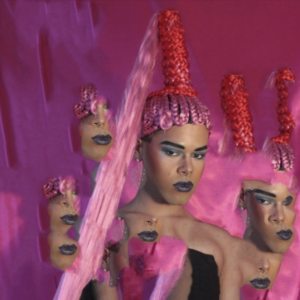Releases from Fade To Mind, the US sister of the Night Slugs label, manage to be both perfectly contemporaneous and yet simultaneously futuristic, at least in the classically dystopian sense of the word. Absolutely now, they present a music which is overwhelmingly born from, fed and fuelled by information noise. This refers equally to the genre-transcending sounds and also the way they are presented: released in byte-sized chunks – single tracks, remixes, EPs at best, and revealed via SoundCloud in rapid bursts, a swarm of inspirations that result in a high-speed, vertiginous club mix built from grime, garage, hip hop and bass music components. It’s a music born of contemporary modes of exchange and diffusion – Fade To Mind displays an extraordinary level of collectivity and osmosis between the artists, who often tend to team up or remix each other. And yet in the work of Kingdom (the label’s founder), Nguzunguzu, Fatima Al Qadiri and others, there also hovers the older conception of dystopian future; the sense of stimulus-fatigue, the friction of co-existence with alienating mass technology.
Forthcoming weeks bring new additions to the Fade To Mind catalogue. The first of these will be by NA (Daniel Pineda), half of label leading-lights Nguzunguzu, whose ‘sad, sexy, scary’, RnB-meets-footwork sound quickly became a point of reference rather than, as is usual, being compared to other artists, after the duo emerged in 2010. As if Nguzunguzu’s works weren’t foot-friendly enough, Pineda announced that the upcoming EP ‘Xtreme Tremble’ will be more ‘dancefloor oriented’. Listening through the three impactful tracks resolves this seeming-paradox: compared to Nguzunguzu, NA’s solo recordings are further stripped-down, confronting the listener with a sound hi-tech, heavy and minimalist at once, thus moving Pineda closer to the territory usually occupied by Kingdom, and thereby cabling another connection between the Fade To Mind roster.
Meanwhile, yet more osmosis occurs beyond the label – for instance, Nguzunguzu have produced two tracks for Kelela, she’s collaborated with Kingdom and will be dropping her Vocalist mix on Fade to Mind soon, while the spirit of cooperation extends beyond the limit of the label itself. Future Brown –a collective project consisting of Pineda, his original band mate Asma Maroof, long-time collaborator Fatima Al Qadiri, and J-Cush of Lit City Tracks -have released just one track so far (independently from Fade To Mind). The surprisingly simple, hooky, club-friendly ‘Wanna Party’ features Chicago rapper Tink and production from (inevitably!) another Fade To Mind artist, vogue/ballroom-house DJ and producer MikeQ. The slightly trappy track provides a sneak-peek of Future Brown‘s full album, which will also feature Shawnna, Maluca, Ian Isiah and Kelela. Even though there has been little revealed about the project (and the record itself is still in the making), what we know about the project so far suggests it will function as a summary of a certain aesthetic: unashamed genre cross-pollination, a collaborative working policy, and the implicit idea of Web-driven club music.
The imagery Future Brown choose to employ reveals the latter explicitly: they share both their initials and their logo font with Facebook, reinforcing the fact of the Web as an environment in which their brand of music thrives, as much as it does on the dancefloor. The aesthetic employed by Fade To Mind-related artists seems to acknowledge the point that, no matter where the artist ideally imagines their work being played out, in reality it is all-too-often heard through ubiquitous white ear buds or tinny laptop speakers. This may actually have informed the label’s signature sound palette; as per Kingdom’s work, his label’s output teems with the nag of ringtone-synths, a hyper-bright, brittle 8-bit aesthetic and a certain plasticity, which can evoke a Fisher-Price version of Raster-Noton.
Future Brown’s forthcoming LP will most likely be an interesting detour taken by these artists, both when it comes to sound (more hip hop-influenced), as to the shape and length of the album. Fade to Mind’s policy, on the other hand -small doses of singles, EPs and unaccompanied tracks -may have yet more method to it, understood after an extended encounter with their output: whilst many of them are thrillingly heady, attention-grabbing and intense, sometimes their chiptune-on-steroids, cropped and distorted edges make them easy to overdose on. The future, unless taken in moderation, is (as it turns out) a disorientating place to be. **
NA’s Xtreme Tremble EP is out on Fade to Mind September 2, 2013.
















